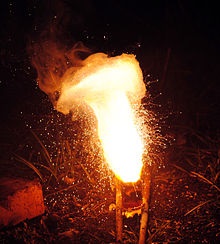|
|
| |
|
|
| |
|
|
|
|
| |
 |
| A thermite reaction
using iron(III) oxide. The sparks flying
outwards are globules of molten iron trailing
smoke in their wake. |
Reaction
A chemical reaction is a process that leads to the
chemical transformation of one set of chemical
substances to another. Classically, chemical reactions
encompass changes that only involve the positions of
electrons in the forming and breaking of chemical bonds
between atoms, with no change to the nuclei (no change
to the elements present), and can often be described by
a chemical equation. Nuclear chemistry is a
sub-discipline of chemistry that involves the chemical
reactions of unstable and radioactive elements where
both electronic and nuclear changes can occur.
The substance (or substances) initially involved in a
chemical reaction are called reactants or reagents.
Chemical reactions are usually characterized by a
chemical change, and they yield one or more products,
which usually have properties different from the
reactants. Reactions often consist of a sequence of
individual sub-steps, the so-called elementary
reactions, and the information on the precise course of
action is part of the reaction mechanism. Chemical
reactions are described with chemical equations, which
symbolically present the starting materials, end
products, and sometimes intermediate products and
reaction conditions.
A chemical reaction happens when one or more chemicals
are changed into one or more other chemicals. Examples: |
- iron and oxygen combining to make
rust
- vinegar and baking soda combining to
make sodium acetate, carbon dioxide and water
- things burning or exploding
- many reactions that happen inside
living things
- electrochemical reactions when
discharging or recharging batteries
|
Some reactions are fast, and others are slow. Some happen at
different speeds, depending on temperature or other things.
For example, wood does not react with air when it is cold,
but if it is made hot enough, it will start to burn. Some
reactions give out energy. These are exothermic reactions.
In other reactions, energy is taken in. These are
endothermic reactions.
Nuclear reactions are not chemical reactions. Chemical
reactions involve only the electrons of atoms; nuclear
reactions involve the protons and neutrons in the atomic
nuclei. |
|
Four basic types
Synthesis
In a synthesis reaction, two or more simple substances
combine to form a more complex substance.
"Two or more reactants giving one product" is another
way to identify a synthesis reaction. One example of a
synthesis reaction is the combination of iron and sulfur
to form iron(II) sulfide:
Another example is simple hydrogen gas combined with
simple oxygen gas to produce a more complex substance,
such as water. |
|
Decomposition
A decomposition reaction is when a more complex
substance breaks down into its more simple parts. It is
thus the opposite of a synthesis reaction.
One example of a decomposition reaction is the
electrolysis of water to make oxygen and hydrogen gas.
Single replacement
In a single replacement reaction, a single uncombined
element replaces another in a compound; in other words,
one element trades places with another element in a
compound.
One example of a single displacement reaction is when
magnesium replaces hydrogen in water to make magnesium
hydroxide and hydrogen gas. |
|
Double replacement
In a double replacement reaction, the anions and cations
of two compounds switch places and form two entirely
different compounds. These reactions are in the general
form:
For example, when barium chloride (BaCl2) and magnesium
sulfate (MgSO4) react, the SO42− anion switches places
with the 2Cl− anion, giving the compounds BaSO4 and
MgCl2.
Another example of a double displacement reaction is the
reaction of lead(II) nitrate with potassium iodide to
form lead(II) iodide and potassium nitrate: |
|
 Kiddle: Chemical reaction Kiddle: Chemical reaction
Wikipedia: Chemical reaction |
|
|
|
|
|
|
|
|
|
|
|
|
|
|
|
|
Search Fun Easy English |
|
|
|
|
|
|
|
|
|
|
|
|
|
|
|
About
Contact
Copyright
Resources
Site Map |